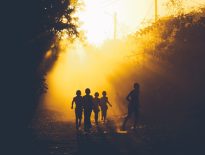Some said one among the village folks had angered the gods by not offering the yearly sacrifice to our god, Leza. Some had the impression that someone had somehow woken some dark spirits of dead old witches who once tormented our land. Everywhere and everyone around our village was growing restless. This year’s rains did not know just when to stop, they went on for three moons even when our crops and soon-to-be harvests became waterlogged! From those who cultivated maize to those who planted beans and other homegrown crops, it was catastrophic.
Just as the rains stopped everyone was in extreme panic and restlessness. The same morning, we gathered in front of our village barn. It was built by us – the dwellers of Msanzi – under the pioneering and leadership of our last chief the late Chief Simwela specifically for unfortunate times like this when almost every village folk did not know what they would put in their bellies for mid-day and sunset. So in front of the village barn, all of us gathered to wait for our leader, Chief Simbachawene.
“My fellow folks of Msanzi.” After hearing our Chief’s charismatic voice, everyone was relieved in one way or another. The Chief went on, “In this farming season, the rains have poured down upon us more heavily than any of us ever expected. Even our great weatherman Mzee Kalambo.” (Chief Simbachawene dryly chuckled). This remark made some people around the back start whispering indistinctly because never before had Mzee Kalambo’s weather predictions gone wrong. It seemed like at the time; he could not see what could have happened. Chief Simbachawene cleared his throat and went on,
“.. but now is not the time to point fingers. We have our village barn, so we shall share among us these baskets of beans and sacks of maize to help us through this critical phase. Everyone among us should group themselves in accordance with their kin so that the process of providing rations may commence.”
Everyone hailed the chief and began gathering ourselves with our families. Those who were by themselves like Bwana Kandege who was always coming in and going out of Msanzi claiming he had a business going on in Matai, our neighbouring village, just stood there by himself, eyes up, arms akimbo like a philosopher in contemplation. Too much time passed following the moment the Chief went inside the house with his council of advisors. People began shouting exclamations and ululations, calling him. The noises and commotion grew higher and more chaotic. The Chief’s guards had to form a single file in front of us to calm us down. When the Chief came out to address us, somehow his face looked pale with a mélange of confusion and rage.
“Our village barn has been robbed!” He shouted with a raging yet shaky voice. Expectedly, we were shocked, enraged, angered, lost for words… and every word you can use to describe the feeling you get when you’re literally told that there won’t be any food for you to eat today and tomorrow and the day after tomorrow!
“Whaaaat!”
“Who did it!?”
“Who stole our food!?”
People threw their anger and rage in the air but our Chief did not have any answer. He was just as shocked and caught off-guard as the rest of us. I could not believe what I just heard from the Chief. I had not eaten since I chewed some three-year-old dry cassavas the day before. So, I too was confused!
We had to storm the barn to see for ourselves if what the Chief had told us bore any truth. Upon entering the barn, there were no baskets of beans nor sacks of maize we worked so hard to cultivate. Unfortunately, we fooled ourselves that our village had peace and therefore, the barn was only under the protection of Leza!
Thirteen nights had passed since our village barn had been robbed. Mothers were having trouble breastfeeding their infants as the only food we could eat was dry cassavas once a day with gallons of water. One day, a boy almost broke his little sister’s arm when fighting over dry cassava during the sunset meal! Just over a day later, one man almost starved to death after he came home to find his dry cassavas stolen; he had not eaten for four nights.
One quiet afternoon, three children were playing under a tree near Mzee Kalambo’s residence, one among the three called Mlumendo thought he had smelled cooked beans or something similar.
“Hey folks, come on!” Mlumendo yelled to the other three.
One boy, the tallest among them, yelled back, “What now!?”
Mlumendo pointed to Mzee Kalambo’s house: “I think I smelled some cooked beans coming from yonder. Can you smell it too!?”
“Beans!? In times like this!? I don’t believe it” the third boy exclaimed.
“Come on, I swear I can smell some beans,” Mlumendo whispered. “Let’s go see it for ourselves”
The tallest boy said, “… but that’s the weatherman’s house. Who knows what he could do to us if he catches us spying on him!!”
“… that is only if we get caught!” Mlumendo and the third boy told the tallest boy.
They covertly approached Mzee Kalambo’s house. When they neared its proximity, they saw three large open sacks towering over two silhouettes.
“After this trip, I’m telling you Mzee Kalambo, you will never need to be a weatherman again!” The fairly elegant silhouette told the other fairly short silhouette. “Come on now Bwana Kandege!” the fairly old and short silhouette chuckled and retreated into the house.
All the boys were startled and lost for words. After many village folks along the way yelled at them “Why are you running!?” it was when they realized they were running as crazy as wounded warthogs. They ran directly to the Chief’s palace. At the gate, they ran into the third boy’s father who was the commander of the Chief’s royal guard.
“Father!! Father!! We just saw two sacks of maize.”
“They were three!” Mlumendo cut in. “They were outside the weatherman’s house.”
“What!!?” the third boy’s father was just as surprised to hear this as the Chief who was by now passing behind the third boy’s father.
“Okay boys, go home! We will take care of this,” the third boy’s father told the three boys. They heard what they had been told but they just stood there like statues.
“Hey come on. What have I just said?”
“Okay father!” the third boy took his friends, and they ran home leaving the Chief and the third boy’s father talking indistinctly at a distance.
The next day, the Chief called for an emergency village meeting. When some heard the horn calling for the meeting, they did not want to heed to the “noises” of the call. People’s bellies were empty; they had justifiably lost hope because even the farms were still waterlogged. Resuming farming was not a possibility. This meeting was unlike previous emergency village meetings called by the Chief. In this one, even the children were allowed – like the day our village barn was robbed.
Village folks gathered and the Chief sternly stood to address us.
“Leza forgive us!” he looked up. Seeing him do that, the village folks started murmuring. He sighed and went on.
“A fortnight ago, our village barn was robbed. Every village folk knows that. But it was not until yesternight that our royal guard, with the help of a tip from three anonymous boys, apprehended the folks behind this calamity that has befallen us.”
Some murmurs and shouts rose from village folks. We were all eager, angry and curious to know who were the folks who made us live on a special “diet” of dry cassava for two-dozen days. The Chief calmed us and proceeded.
“Yesternight, Mzee Kalambo, our weatherman, alongside his accomplice Bwana Kandege were caught in an attempt to smuggle three sacks, two of maize and one of our beans. After searching Mzee Kalambo’s and Bwana Kandege’s houses, we found other four sacks of maize and three sacks of beans hidden in their houses. In normal circumstances, this is the Commander of the Royal Guard’s duty to make this announcement, but these two folks had left our lives in an unspeakable hunger! No one ever thought this calamity could have been the weatherman’s creation with the help of a mysterious businessman! I am bitterly disappointed in those two. But for the three boys who tipped the royal guard, I can never be prouder of how brave they are.!”
The sacks of maize that were recovered by the royal guard were equally distributed to all the families. The Chief himself rewarded the three boys handsomely with some fine royal meal and clothing! The same fine clothing I’m wearing as I narrate this story. It’s I, Mlumendo. One among the boys who helped save my village from empty bellies.
Read – The Maid of the House – A Short Story by Dwamena-Asare Elizabeth, Ghana
——-
The Writers Space Africa(WSA) Magazine is published by a team of professionals and downloadable for free. If you would like to support our work, please buy us coffee – https://www.buymeacoffee.com/wsamagazine








Honoured to be a part of such a decorated magazine 🙏
I must say I liked how you concluded your story, it’s very captivating.
It is in line with what happens in our societies today, where those in authority abuse / misuse their power on the citizens. They make us suffer a lot.
Congratulations Bruno Daniel.
Kindly email me via byronejuno3@gmail.com
Thanks.